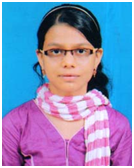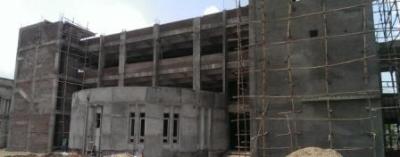|
|
|
VOHRA-COMMUNUTY NEWS |
ACHIEVEMENTS |
A.Y.D. ACTIVITIES |
MARRIAGE AND ENGAGEMENT |
| Ahmed Ismail (munna) Hashambhai weds with Fatema Abubakar Salehbhai at Rander. |
BIRTH |
| Imran Muhammed (Gora) Mamun blessed with baby boy named Ibrahim.. |
DEATH-INNALILLAH |
| Yusuf Ahmed Ishhak Khandiya passed away. |
GOING TO FOREIGN |
| Salman Ahmed (Munna) Bhaimia went for Umrah. |
|
|
|
-
PROUD OF THE COMMUNITY |
 |
Native of Rander, Dist. Surat (Gujarat, Inida) Miss Fatima Ahmed Saleh has Passed Std. 12 in Science Stream exam taken through Gujarat Secondary – Higher Secondary Education Board, Gandhinagar, in English Medium in March 2015 obtaining 93.54% “A-1”Grade, with 99.91 Percentile and she also obtain 226 out of 360 in JEE main exam. |
She stood at 1711th out of 14 Lacs students all over India in Entrance exam JEE advance.She praises her home land and the community. We congratulate her and may Allah Subhhanahu Ta’ala give her every success in her future venture and healthy long life. Ameen. |
|
|
Ughratdar Masuda Md. Rasid |
Percentile-99.40
Percentage-87.50 %
KHAROD
MORE |
|
|
Fatima Ahmed Saleh |
Percentile-99.91
Percentage-93.53 %
RANDER
MORE |
|
|
Mr. Juned Soyab Amla of Surat Passed M.Pharm. exam taken through Gujarat Technological University, Ahmedabad, from Dhanvantry Pharmacy College, Kim stood in 1st Class.He praises the community, we congratulate him and wish all the success in the future ventures. MORE |
|
A humble Appeal for under construct Administrative Building |

 |
By the grace of Almighty Allah and by Duaas of well wishers, donors, Administrative building is near completion. It cost will be around Rs. 4 to 5 Crore, Hence at this stage we humbly appeal to our generous well wishers and donors to come open heartedly to help us and collect for fund for this mega project. Read More |
 |
This message was for our Rahein-3 which lapse now placed here.-Dr.M.D.Lockhat |
To,
M.M.DALCHAWAL
Principal
A Y D Technical Institute Kosamba.
Thank you for asking me to write a goodwill message in 'RAHEIN' the magazine published by A Y D Technical Institute, Kosamba.Read More |
|
|
A Humble Appeal |
Assalamualaykum V.V.
Dear donors and well wishers,
We appricite and express our co-hearted gratitude to our generous donours all over the world for their kind and sympathetic consideration and praises for generous charities to our "Suratee Sunni Vohra Muslim Education Society,Surat" We hope they will continue this noble deed till their last breath, Inshaallah. Read More |
|
IMPORTANCE OF ZAKAT IN ISLAM
|
What is Zakat?
Indeed, those who believe and do righteous deeds and establish prayer and give zakat will have their reward with their Lord, and there will be no fear concerning them, nor will they grieve’. (Translation of Surah Al-Baqarah, 2:227). Zakat is the third pillar of Islam, and the word means ‘that which purifies’. Giving zakat is considered a means of purifying one’s wealth and soul. Paying zakat is an obligatory act upon all Muslims who are sane and have the financial means (above the nisab threshold) to pay every lunar year. Nisab is the amount which savings or capital must exceed in order for the Muslim to be obliged to give zakat. The amount of zakat to be paid by an individual depends on the amount of wealth and the type of assets the individual possesses, so a 2.5% zakat is paid for capital assets such as cash, gold and silver. However, if their wealth amounts to less than the threshold figure (nisab) then no zakat is payable. |
|
Zakat expenditures are only for the poor and for the needy and for those employed to collect [zakat] and for bringing hearts together [for Islam] and for freeing captives [or slaves] and for those in debt and for the cause of Allah and for the [stranded] traveller - an obligation [imposed] by Allah. And Allah is Knowing and Wise |
|
The Qur’an mentions eight categories in how the Zakat money can be spent. The Zakat money cannot be used for anything else apart for:
- The poor (Faqir/Fuqara) - Those without any means of livelihood and material possessions.
- The needy (Masakeen) - Those without sufficient means of livelihood to meet their basic necessities.
- The administrators of Zakat (Aamil) - Those appointed to manage and administer Zakat.
- The sympathisers (Muallaf) - Those who are inclined to enter or have already converted to Islam.
- To free slaves (Riqab) - Zakat can also be used to free slaves or captives.
-
Those who are in debt (Gharimin) - Zakat can be used to pay off the debts of a person who has borrowed to pay for basic necessities so that he/she can lead a normal life. Zakat can also be distributed to those in financial difficulties e.g. bankruptcy due to the loss of employment and heavy debt.
-
For the cause of Allah (Fisabillillah) - Zakat can be used to finance any form of struggle or work for the love of Allah. The following examples fall under this category, e.g. Da'wah; building & developing society's infrastructure; defending Muslims, who are being oppressed; assisting poor travellers and sponsoring a student's educational expenses.
-
Those who are stranded during a journey (Ibnus Sabil) – Zakat can also be used to help a traveller facing difficulties in continuing his journey due to reasons such as loss of money or the breakdown of his vehicles, the repair of which he cannot afford.
The Punishment For Not Giving Zakat
Allah says in the Quran: "And there are those who hoard gold and silver and do not spend it in the way of Allah, announce to them a most grievous penalty (when) on the Day of Judgment heat will be produced out of that wealth in the fire of Hell. Then with it they will be branded on their forehead and their flanks and backs. (It will be said to them) This is the treasure which you hoarded for yourselves, taste then the treasure that you have been hoarding." (Al-Quran 9:34-35) |
|
Items on which Zakat is payable: |
- Business
- Rental Income
- Personal Income
- Savings
- Gold and Silver
- Shares
- Livestock
- Agriculture produce (crop)
- Produce of mines
- Cattle
- And more..
|
|
For payment of Zakat, there are three conditions that need to be followed: |
-
Zakat is payable when a Muslim is in possession of wealth above the prescribed limit called “Nisab” that is 2.5 % of this possession.
-
They must have possessed this money or the wealth above the prescribed limit for one whole year.
-
The Zakat must be paid to those Muslims who are in need and deserve it, as laid down in the Quran and as explained by the Prophet Mohammad (peace and blessings of Allah he upon him).
|
|
The Rates of Zakat |
Zakat needs only to be paid on those assets that exceed a prescribed limit or minimum value. This minimum value is calculated based on the market price of 85 grams of gold or 595 grams of pure silver. They must have owned them for one whole year and they must pay 2.5 % of the total possession. |
|
|